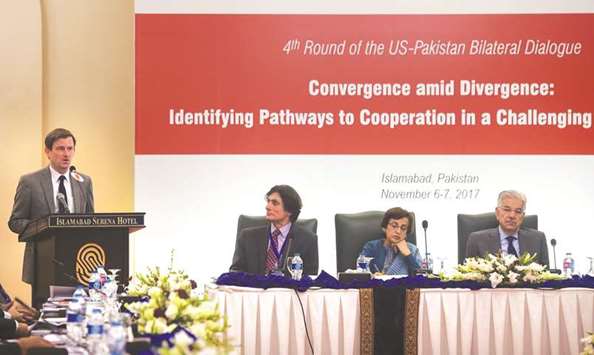Pakistan believes in regional peace and welcomes mediation by the United States in easing tension with India, Foreign Minister Khawaja Asif said yesterday.
Addressing the fourth round of US-Pakistan Bilateral Dialogue in Islamabad, Asif said Pakistan has always preferred a comprehensive dialogue with its South Asian neighbour that could contribute to peace in the region, Radio Pakistan reported.
The dialogue, titled ‘Convergence amid Divergence: Identifying Pathways to Co-operation in a Challenging Environment’, was called to deliberate on ways to ease the strain in bilateral Pakistan-US ties.
Commenting on the new US strategy for South Asia and the role accorded to India in the policy, the minister said US has assured Pakistan that New Delhi’s role in Afghanistan would be limited to providing economic assistance to the war-torn country.
Pakistan has repeatedly expressed concern over India’s role in the US strategy, saying its security concerns in the region should be recognised.
While announcing his strategy for the region, US President Donald Trump had said the US appreciates India’s important contributions to Afghan stability. But he also lamented that India “makes billions of dollars in trade with the United States.”
Trump had said he wanted India to provide more economic assistance and development to Afghanistan.
Pakistan’s counter-terrorism efforts have prevented “countless” militant attacks in the US and Europe, Asif said, adding that Pakistan and US both have a lot of work to do in fighting negative perceptions.
The foreign minister said self-defence and self-interest is Pakistan’s foremost priority and the country will not allow its soil to be used against any other country.
He said Pakistan is ready to extend all possible co-operation to achieve the goal of peace and stability in Afghanistan. In line with the same efforts, Pakistan has also reached out to regional countries and forums like South Asian Association for Regional Co-operation (Saarc).
Saarc should be activated and steps should be taken to promote trade in the region which has suffered for long due to instability in Afghanistan, he said.
Asif said intelligence sharing is vital for improving border management with Afghanistan, adding that the US should share timely intelligence so that Pakistan can take action.
Talking to reporters, the minister said differences in Pak-US bilateral ties are only misconceptions which are being removed by continued dialogue.
Asif added that recent high-level exchanges between the two countries have helped relieve the tension in the relationship.
Asif told the media after the diplomatic talks in Islamabad that India’s influence in Afghanistan has created chaos in the war-torn country.
“Pakistan is against India’s intervention in Afghanistan,”Asif said.
The minister also emphasised the need for immediate removal of what he called terrorist safe havens in Afghanistan, adding the US Afghan policy was damaging the reconciliation process in the country.
Asif added that Afghanistan’s economy and structure had been hampered and damaged by years of war and there were multiple pressure groups which wanted the war to continue.
He said Islamabad suggested that Afghan refugees in Pakistan needed to be sent home.
But US officials objected, saying Kabul was “too unstable”.
“It is not our problem,” Asif said referring to the refugees. “The US can invest in the replacement of these refugees to their home country.”
He added that US-Pakistan relations needed to be worked on and the “blame game” needed to end so that both countries may work towards mutual understanding.
Earlier, US ambassador David Hale said India’s role in Afghanistan was restricted to only economic assistance.
He added that both Pakistan and India needed to improve relations and urged both countries to make efforts for regional peace.
Hale said the US had told Pakistani officials to take decisive action against terrorists active from its soil.
“US Secretary of State Rex Tillerson has conveyed to the political and military leadership in Pakistan that the Pakistan-US relations are at a crucial juncture and if they don’t cooperate, we will act accordingly,” he said.
The meeting in Islamabad was also attended by Foreign Secretary Tehmina Janjua, Hale and Wilson Center Asia Programme Deputy Director Michael Kugelman among others.

US ambassador to Pakistan David Hale (left) speaks as Pakistani Foreign Minister Khawaja Mohamed Asif (right) listens during the 4th Round of the US-Pakistan bilateral dialogue in Islamabad yesterday. The event, organised by private think tanks, is aimed at improving US-Pakistan relations, and working towards a resolution to the conflict in neighbouring Afghanistan.
